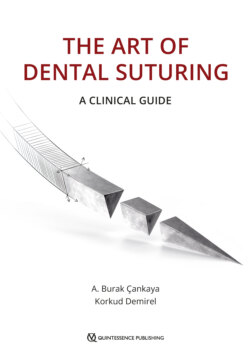Читать книгу The Art of Dental Suturing - A. Burak Çankaya - Страница 8
На сайте Литреса книга снята с продажи.
ОглавлениеCONTENTS
Acknowledgment
About the authors
Types of wound healing
Chapter 1: Wound healing
Introduction
Phases of wound healing
Hemostasis and inflammation
Proliferation
Remodeling and maturation
Typical characteristics of oral mucosal wound healing
Wound healing and systemic factors
Age
Nutrition
Dehydration
Diabetes
Nicotine intake
Diseases and/or therapies affecting the host defense mechanism
Drugs and wound healing
Antithrombotic therapy
Antiangiogenic agents
Antiresorptive agents
Corticosteroids
Local factors affecting wound healing
Direction and length of incision
Surface angle of incision
Hemostasis
Tissue moisture control
Removal of necrotic tissue and foreign bodies
Prevention of dead space in wounds
Tissue tension
Infection
Wound and clot stabilization
Blood supply to the wound site
Enhanced visualization
Recommended reading
Chapter 2: Suture materials and suturing instruments
Suture threads and needles
Physical properties of suture threads
Gauge
Physical structure
Capillarity
Tensile strength
Tissue passage
Knot-holding security
Elasticity
Shape memory
Absorption characteristics of suture threads
Absorbable suture threads
Absorbable natural suture threads
Absorbable synthetic suture threads
Non-absorbable suture threads
Non-absorbable natural suture threads
Non-absorbable synthetic suture threads
Suture needles
Needle anatomy
Hand instruments
Needle holders
Scissors
Tissue forceps
Tissue adhesives
Fibrin adhesives
Collagen and protein-based adhesives
Cyanoacrylates
Polyurethane adhesives
Recommended reading
Chapter 3: Suturing techniques
General principles of suturing
Suture characteristics
Suturing techniques
Operational safety
Function-based classification of suturing techniques
Wound closure sutures
Interrupted sutures
Simple and locking continuous sutures
Corner sutures
Displacement sutures for approximating wound margins
Sling sutures
View-enhancing (tissue retraction) sutures
Fixation sutures for biomaterials or grafts
Membrane fixation sutures
Sutures for adapting autogenous soft tissue grafts to the recipient site
Sutures for securing surgical dressings or packings
Hemostatic sutures
Positioning sutures
Sutures to prevent foreign material from traveling into deep tissue
Abscess drainage sutures
Recommended reading
